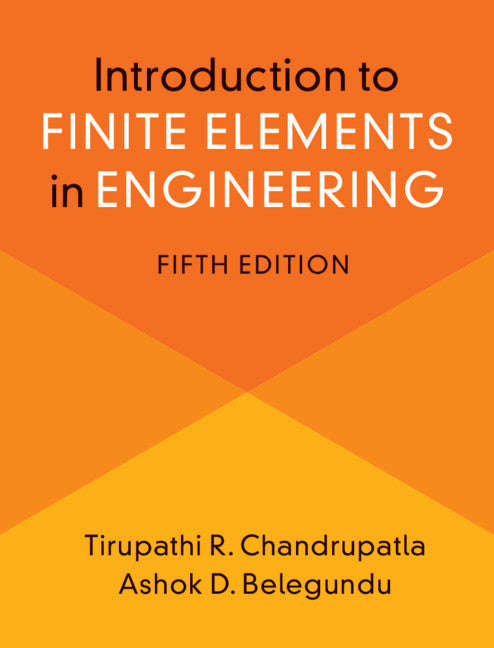Freshly Printed - allow 4 days lead
Couldn't load pickup availability
Introduction to Finite Elements in Engineering
Now thoroughly updated, the fifth edition features improved pedagogy, enhanced introductory material, and new digital teaching supplements.
Tirupathi Chandrupatla (Author), Ashok Belegundu (Author)
9781108841412, Cambridge University Press
Hardback, published 21 October 2021
550 pages
25.2 x 19.3 x 2.6 cm, 1.26 kg
'The new edition (of the book) is carefully structured to provide the necessary theoretical background to easily understand and to adapt the same to model and to solve 1D, 2D, and 3D mechanical engineering problems in the structural and thermal areas.' Professor Raghu Echempati, Kettering University
Thoroughly updated with improved pedagogy, the fifth edition of this classic textbook continues to provide students with a clear and comprehensive introduction the fundamentals of the finite element method. New features include enhanced coverage of introductory topics in the context of simple 1D problems, providing students with a solid base from which to advance to 2D and 3D problems; expanded coverage of more advanced concepts, to reinforce students' understanding; over 30 additional solved problems; and downloadable MATLAB, Python, C, Javascript, Fortran and Excel VBA code packages, providing students with hands-on experience, and preparing them for commercial software. Accompanied by online solutions for instructors, this is the definitive text for senior undergraduate and graduate students studying a first course in the finite element method and finite element analysis, and for professional engineers keen to shore up their understanding of finite element fundamentals.
1. Energy and Galerkin Approaches
2. Gaussian Elimination
3. One-dimensional Elasticity
4. One-dimensional Heat Conduction
5. Trusses
6. Two- and Three- Dimensional Elasticity
7. Axisymmetric Problems in Elasticity
8. 2D / 3D Heat Conduction and Other Scalar Field Problems
9. Elements in Bending
10. Structural Vibration
11. Miscellaneous Topics
12. Preprocessing and Postprocessing.
Subject Areas: Mathematical & statistical software [UFM], Electronics & communications engineering [TJ], Mechanics of solids [TGMD], Mechanical engineering & materials [TG], Technical design [TBD], Technology, engineering, agriculture [T]


